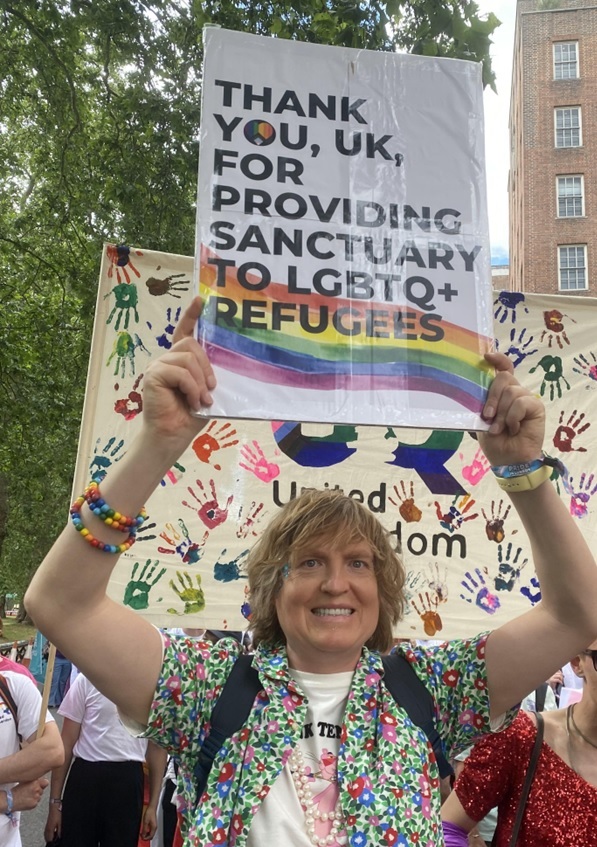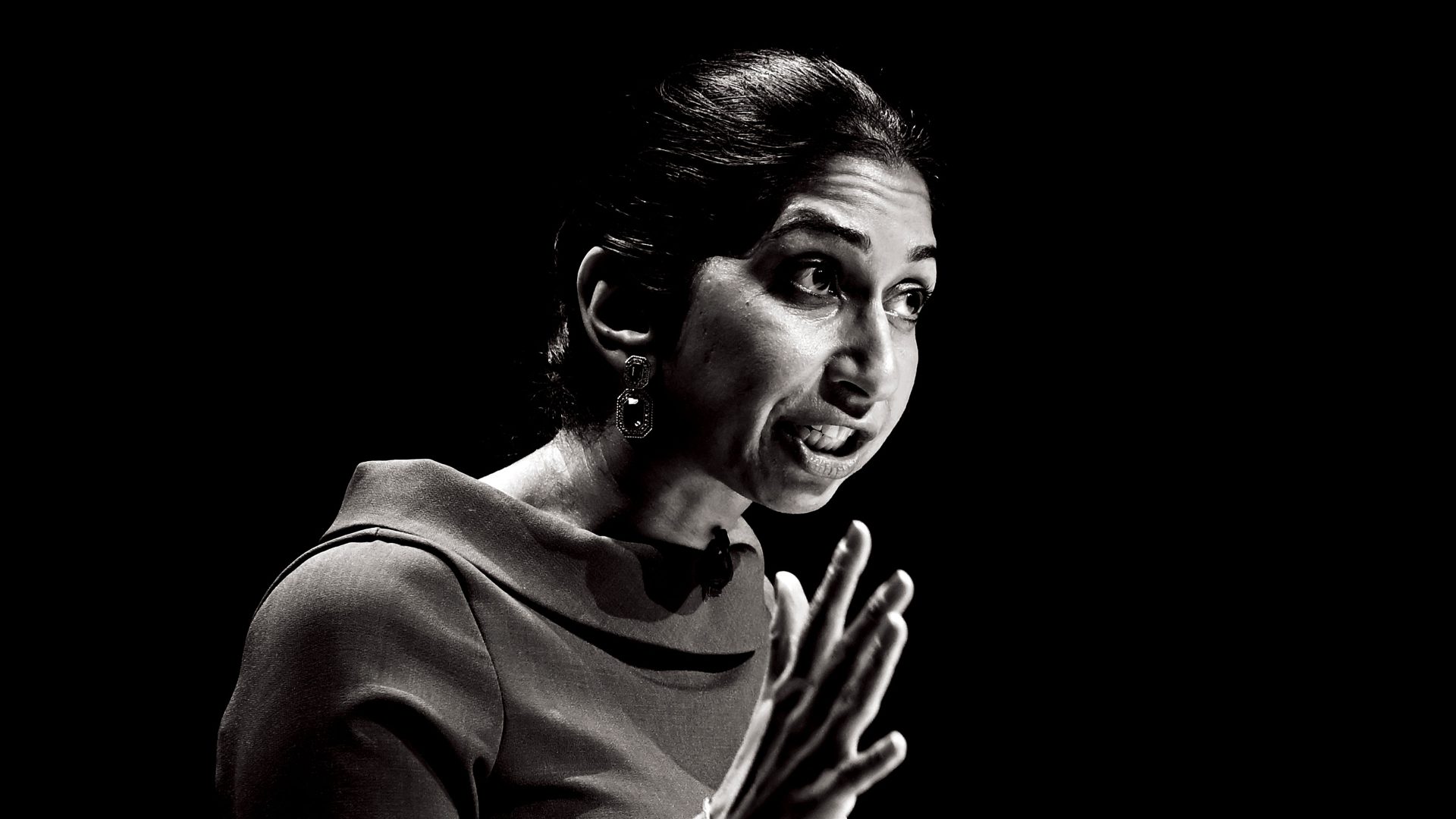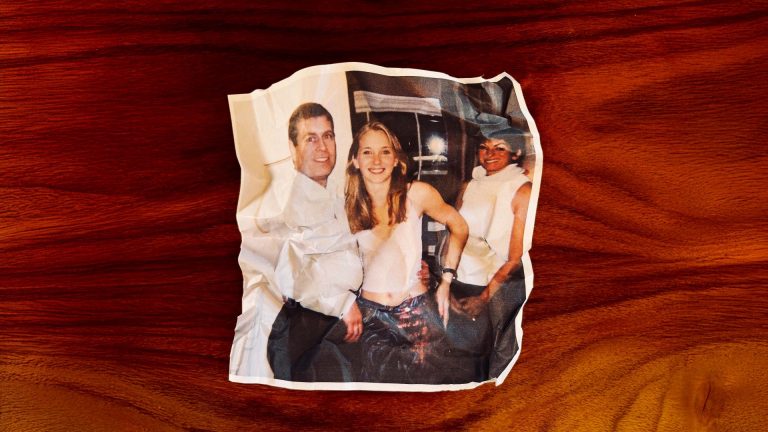Last week, Eugene proudly posted a picture of his shiny new biometric residence permit on Facebook. Having arrived as an asylum seeker in the UK in January 2022, it took 19 months for the Home Office to assess his claim and grant him refugee status.
The thick folder of documents that he presented to the Home Office about his former life in Russia
makes for chilling reading. Death threats. Pictures of mutilated bodies, with promises to do the same to him. Homophobic abuse. Eugene was in danger not only as a gay man, but also an activist: he ran
Guys Plus, a website for the LGBTQ+ community in Russia, with a focus on sexual health. The Russian
government classified the charitable foundation as a “foreign agent” and began an investigation on trumped-up allegations of fraud.
By contrast, Eugene speaks of his new life in the UK with an exuberant positivity: he marches at Pride parades, volunteers with a local HIV charity in Bristol, and has made friends with a gay couple who have adopted a child. Eugene hopes to do the same someday.

He speaks warmly of the UK’s “European values” that “put people and their welfare first”. Above all, he feels safe here: “There’s a government that defends my basic human rights and social rights, and I’ll pay taxes and live in this state of harmony.”
This state of harmony? Eugene’s language seems strangely out of place. But he is not being sarcastic. He extols the simple joys of civics as if they were a yogic incantation. Taxes. Welfare. Safety. Here in the UK, we have come to take the post-war settlement of social democracy for granted and forgotten how hard-won it was. How many people in the UK would feel privileged, as Eugene does, to spend a Saturday afternoon outside Temple Meads station rattling a can for charity?
And yet social democracy does have a magic all of its own, even in post-Brexit Britain with its ailing infrastructure. Eugene emerges from an appointment at Southmead Hospital with a wide grin. He praises the friendly nurses, the fact that there are no cash registers, and, above all, the fact that no-one bats an eyelid when he tells them he is gay.
Eugene would hardly have recognized the Britain that he has come to love if he watched the coverage of the recent Conservative Party conference. European values? Kemi Badenoch, Suella Braverman, and Michael Gove sought to outdo each other as they campaigned to withdraw from the ECHR. Tolerance in the NHS? Let’s hope that the nurses don’t follow the lead of their boss, health secretary Steve Barclay, who gained cheap applause for his pledge that transgender patients would have to be treated in wards according to their sex assigned at birth.
Braverman, too, got a standing ovation for a speech that listed “gender ideology” and “anti-British history” as part of a litany of “woke” ills in contemporary British society. Eugene would, at least, have understood this language, because “gender ideology” is a dog-whistle to homophobes and transphobes not only in the UK, but also in Putin’s Russia. Substitute “anti-British history” for “Russophobia” and you have the makings of a speech from a Kremlin loyalist.
If Braverman gets her way, the UK may not be a safe haven for LGBTQ+ refugees for much longer. Her intervention last week criticizing the foundations singled out LBGTQ+ asylum seekers as a cause for concern. Braverman did admit that “where individuals are being persecuted, it is right that we offer sanctuary.” But she added that “simply being gay… or fearful of discrimination in your country of origin” is not sufficient for claiming asylum.
Are LGBTQ+ refugees in the UK seeking asylum simply because they are “gay” or have faced “discrimination”? I spoke to Tom Daly, manager of Pride without Borders, a project that works with LGBTQ+ asylum seekers and is part of the charity Bristol Refugee Rights. Daly replies that the vast majority of come from primarily from east Africa (Uganda, Somalia) and south Asia (Pakistan, Bangladesh). In all these countries, consensual same-sex acts are illegal.
Uganda passed an Anti-Homosexuality Bill in May this year, introducing an even tougher regime. Courts can impose up to a life sentence for consensual same-sex acts, while “aggravated homosexuality” – for repeat offenders, those who spread HIV, and those who have intercourse with a minor, face the possibility of the death penalty. The “promotion” of homosexuality can lead to a sentence of up to ten years. Human rights organizations, including Amnesty, report that Uganda’s anti-gay laws are actively enforced, with reports of mass arrests, police harassment and a spike in anti-gay violence.
The home secretary’s warning about LGBTQ+ refugees seeking asylum simply because they are gay, or fear discrimination, makes little sense in a world that is increasingly homophobic. The spread of anti-gay laws in countries such as Uganda, as well as Russia – which passed a law in December prohibiting the promotion of “non-traditional sexual relationships or preferences” – makes it incumbent on us to expect more LGBTQ+ refugees, not fewer. Yet the Home Office is making it harder, not easier, to claim asylum, with the Illegal Migration Act 2023, the deployment of hostile environment policies, and the threat of the floating barge or Rwanda.
I tell Daly about Eugene’s Home Office file, with the death threats and trail of state persecution. He is not surprised: a large proportion of the LGBTQ+ refugees he supports have experienced physical and/or sexual violence, and in some cases torture. This can happen at the hands of the state, but also at the hands of their community and indeed their own families.
Even in the UK, within their diaspora communities, many LGBTQ+ refugees face ostracization – or worse. Daly recalls being interviewed by a police unit investigating honour-based violence against one of his organisation’s members.
“Do you think LGBTQ+ asylum seekers are unsafe even here, in the UK?” I ask. Daly becomes animated as he discusses the accommodation provided by the Home Office. Asylum seekers are often placed in over-crowded housing. Large, multinational groups of traumatised people are forced together, with LGBTQ+ individuals alongside those with homophobic and transphobic views. LGBTQ+ refugees have reported hate crimes and threats: one man reports being chased with a knife, another being told “I’m going to kill you because you are gay.”
According to Daly, the Home Office waited six months before taking action in this case, leaving the perpetrator and the victim in the same accommodation. The Home Office has been unwilling to engage in dialogue about these systemic problems with its accommodation.
Eugene, though his claim took 19 months, has been fortunate in his housing. He relishes the prospect of improving his English, finding a job, and contributing to the society that has given his a home.
He is proud to be British. Are we?










